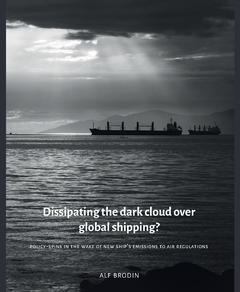During 2016 and into 2017, shipping's emissions to air has attracted a media attention never experienced before. This should be seen in the aftermath of the strategic decisions taken by shipping’s UN-organisation, International Maritime Organisation (IMO). First to establish a global cap allowing a maximum of 0.5% of sulphur in fuel oil from 2020. Secondly, IMO’s decision for a general framework and a plan about how to limit shipping’s emission of CO2 for the future. Third, the vague plan adopted was fiercely criticised and later challenged by the EU Parliament. After a vote in plenary, CO2 emissions from shipping will be forced into the European Trading System (ETS) for CO2 from 2023. But, only if IMO has not, before 2021, introduced a credible plan to reduce emissions.
The sulphur issue has attracted most attention in shipping, where the question of how to organise surveillance is urgent. Surveillance done in the European ECA, show a clear variation in compliance. So far, no IMO plan has been presented for the open sea. Today’s techniques allow only sporadic surveillance at high costs. Owners prepared to take the minimal risk of inspections – will be compensated by windfall savings. When owners do not know that all carry the same costs, compliance level will remain erratic. That said, also the health and environmental advantages, measured in societal benefits, that were the reasond'eter behind the regulations, will not be achieved.
This highly up-to-date book is voicing critique against the decision-making process within the IMO, that allow some large owner countries, to delay and block decisions. Resulting in an erosion of credibility that can come to prove critical for the future recognition of IMO. The book well documents the dynamics in two principal debates at IMO and the continued debate at the EU Parliament, with support of over 200 footnotes.


